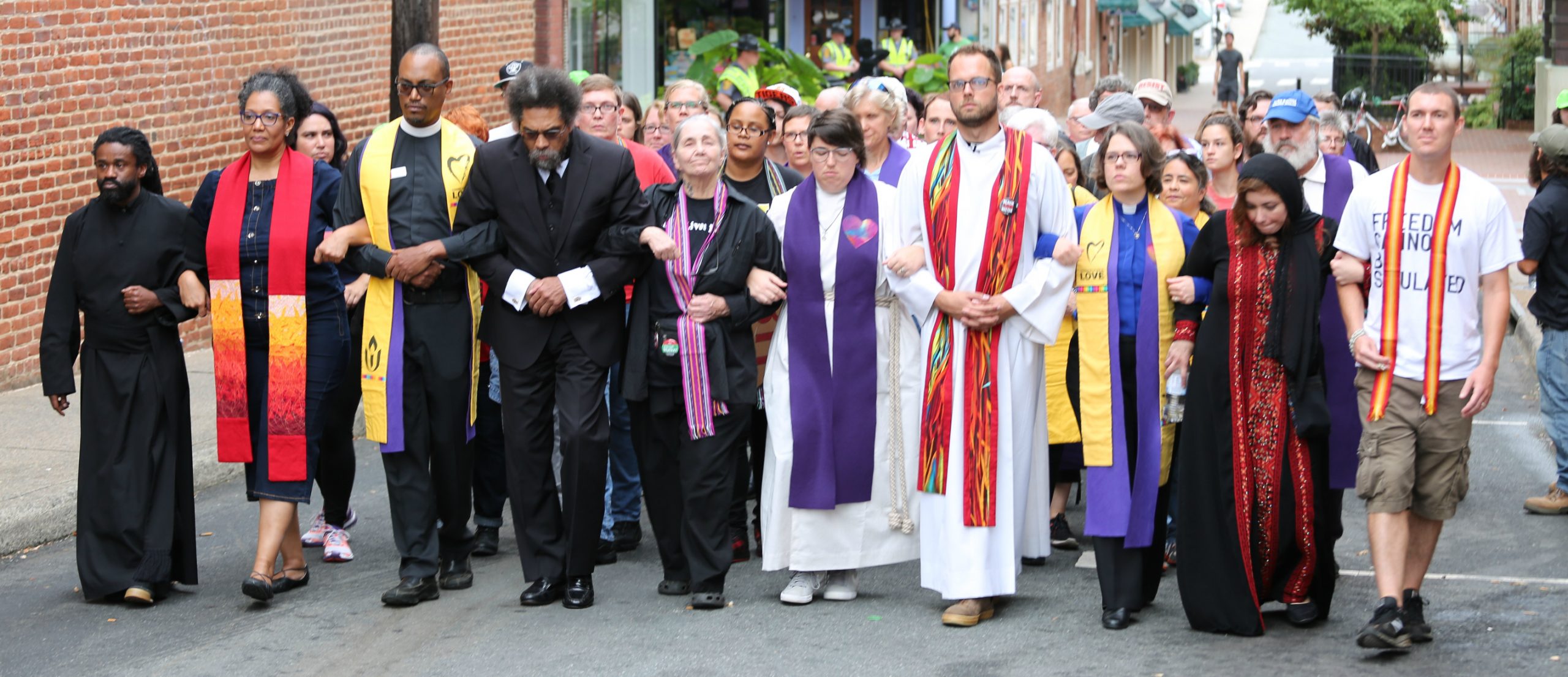Dear Minneapolis,
I write to you from Charlottesville. My heart is breaking for you. In my 20s, in the first years of my marriage, your Southside was my neighborhood. I lived at 28th and Cedar, on the bus line that took my husband and I to and from the University of Minnesota campus for our graduate studies. The Wendy’s behind the Autozone, burned down by protesters, is the same Wendy’s I went to with pregnancy French fry cravings a decade ago. The Target on Lake Street with the now viral video of its looting was where I bought my daughter’s first diapers after we brought her home from the hospital. You were the womb that held me when I first became a wife and a mother.
I’ve called Charlottesville home for the last decade. The parallels between what I see happening in Minneapolis and what I saw here in Charlottesville three years ago are uncanny. This week I’ve kept vigil with Minneapolis, often until 2 or 3 in the morning trying to get my hands on whatever live feeds I can. Everything is so creepily similar to what happened here, but on a much larger scale. The white guys marching with guns or driving around in souped up cars, the shock of violence in places that were once safe havens, and the inconsistent behavior of the police. It’s all the same.
As protests spark around the country, growing bigger by the moment, I don’t have anything to say about the obvious evils of white supremacy that have occurred in both cities. I don’t have any magic book or special documentary series to offer to help understand the history of both events. Even as a social worker, I’m not going to offer any social-emotional tips on how to deal with the stress of it all. There is plenty to be found about those things elsewhere.
Rather, I’m here to warn you of what’s to come.
I’m here to give you a road map into uncharted territory.
I’m here to prepare you.
But most of all, I’m here to say, “take care of yourself.”
BEAR WITNESS
My best wisdom is to hold on to the experiences you’ve had this week, remember their terrifying truth and bear witness to them. Especially those of you who live in the most heavily affected areas, Phillips, Powderhorn, Midtown and Longfellow neighborhoods. Tell the stories of what you saw. Tell them to whomever will listen. Post them on social media. Make them known.
After Charlottesville there were many people – including members of my own family – who said the Charlottesville rallies never happened, or the main stream media blew it out of proportion, or that all the counter protesters were thugs and radicals, rather than regular people trying to defend our city – like Heather Heyer was.
But you know otherwise. You know what you saw. You know the people in the TV footage are your neighbors, not people hired by George Soros or any other right wing conspiracy theory that will take hold in the coming weeks. This week changed everything. It changed who you are, it changed where you live, it changed our nation. Hold on to that, and stand with your city. Bear witness to this pain and lament out loud.
CREATE A COLLECTIVE STORY
In the weeks and months after the rallies in Charlottesville, when the news outlets moved onto the next hot story, the donations to our Black led non-profits dwindled, and the cards and letters of support stopped coming – that’s when the real work started.
Collective trauma can be transformative, or it can be divisive depending on whether or not those affected can agree on a common story. Charlottesville struggled to define this common story, but Minneapolis doesn’t have to. The first city council meeting after the rallies was filled with angry citizens screaming and demanding to know why they weren’t protected by the police. School board meetings broke out into fist fights and arrests over whether or not to create a policy prohibiting confederate flags to be worn on clothing. Any time new people met, there was a quiet sizing up, with the ultimate litmus test being a casual mention of the Confederate statues to see where the other stood. And people stood EVERYWHERE. There were as many opinions on the rallies and the statues as there were people in our small town. No one could agree on what happened or how we could prevent it from happening again. Even within groups that seemed unified from the outside, like anniversary events, there were divisions.
I remember at one point another social worker saying to me, “There is no behavioral norming anymore. We can’t look to those around us to determine what is normal behavior. We must dig down deep into our values and decide how to live, even when no one else around us is living that way.” And though it sounds easy on paper, this is indeed terrifyingly difficult. We are social animals who have evolved over thousands of years to behave in ways that our peers find acceptable. When we don’t know what those around us think is normal, it causes an existential panic. Racism should not be normal. If Minneapolis can create a collective story that normalizes anti-racist behavior, the process of healing from the collective trauma of this week will be easier.
AVOID BURN OUT
Constantly thinking about your values, and deciding how to live often leads to tough decisions to change your behavior or showing up in situations where you’re uncomfortable or even scared. While it’s the right thing to do, it’s also exhausting. When it’s done at a pace as fast as many activists in Charlottesville were demanding, it’s unsustainable. At least in Charlottesville, it seems that the biggest threat to racial reconciliation or community progress has been burn out.
Burn out definitely has a higher effect on people in positions of leadership. Maybe it’s because they have the privilege to leave their positions and find different jobs, or maybe it’s because many of them weren’t Charlottesville locals to begin with, but one-by-one the people who were closely involved in leading the fight against white supremacists at the “Unite the Right” rally began to disappear.
Take a look at these pictures.
These are the faith leaders who led the charge of peace against the advancing white supremacist militias on August 11 and 12th of 2017. While some of them are well known anti-racist theologians like Rev. Sekou, Lisa Sharon Harper, and Cornell West – most were just local pastors. As a progressive Christian in this small town, I knew all of these local leaders either personally or through a friend. I won’t name names, but I will say that today, three years later, almost none of them live in Charlottesville. They burnt out.
And the burn out doesn’t stop at the faith community. Our mayor and vice-mayor. Our police chief. The majority of our police force. Our city manager. Our Parks and Recreation Director. Our manager of the Office of Human Rights. The CEO of our Community Foundation. The President of the University of Virginia. All of them left their positions in the years to come.
In some cases, this left Charlottesville open to much needed new leadership. But in many cases, it felt like a defeat or an abandoning.
PACE YOURSELF
It’s tempting to go fast and strong toward the evils of racism. You’ve been pushed into the deep end and you want to swim as hard as possible. But, you’re not swimming across a pool. You’re swimming across the ocean. Unless you have you have a life jacket to help you stay afloat, you will drown.
The racism of America has taken 400 years to evolve. It won’t be undone in the next several years you can give most passionately to the cause. Perhaps most importantly, people of color don’t need you to show up for just a few years. They need you to show up for the rest of your life, and for your children to show up for the rest of their lives as well. Undoing racism will take generations.
Which leads me to the most important thing I’ve learned in the last three years since the rallies in Charlottesville.
Learn to rest, not to quit.
A year after the rallies in Charlottesville my daughter was diagnosed with Autism. Through my research to learn more about how to support her, I found through disability advocates something called spoon theory. In short, everyone wakes up with a certain number of spoons to use. Some people have dozens of spoons and can use a new spoon every hour on a new task. Others only have a few spoons, and once they have been spent, they are done for the day. Spoon theory applies to activism as well.
Some activists have lots of spoons to give. Some have few. Know your spoons. Rest when they’re gone. For me, as a working mother of an autistic child, this frequently meant saying, “I can’t attend that protest, but I can write a postcard.”
EVERY DECISION MATTERS
Every decision you make in the coming years will have to be based on anti-racist action. There are plenty of resources to advise on what anti-racist action looks like. Begin reading through them and thinking about what you can do. Long-term change won’t be made by everyone doing everything perfectly, but by lots of people making small changes.
For my family after the rallies, it looked like a reevaluation. Where did we live? What schools were we sending our kids to? Where did we attend church? What non-profits did we donate to? What voices did we share on social media? Where did we shop? Were our work places doing enough to think critically about racial equity? We looked at every aspect of our lives and tried to keep in mind the needs of our friends of color. After we made a big decision, particularly ones that seemed quizzical to people not working toward a less racist city, we rested. We rested so we wouldn’t burn out, because I want to be doing this work for a long time.
And here’s where I want to put in a caveat. Don’t use my advice to rest to do nothing. It’s tempting to say, “I’ve been through so much, I deserve a rest” and then never do anything in the service of racial equality again, citing your appearance in Minneapolis after George Floyd’s death as enough work for a lifetime. In Dr. King’s “Letter from a Birmingham Jail” he outlines why Black people can’t wait for equality. Likewise, as communities, as cities, who must move forward with all of our citizens, white people can’t wait either. The advice to rest, rather, says “Do something, but don’t do everything.”
Oh Minneapolis, how I recognize this painful place you’re in. Even as your streets are still filled with smoke, and it feels unsafe to be outside, you are recovering. Like a phoenix you will rise from the ashes. You will be resilient.


